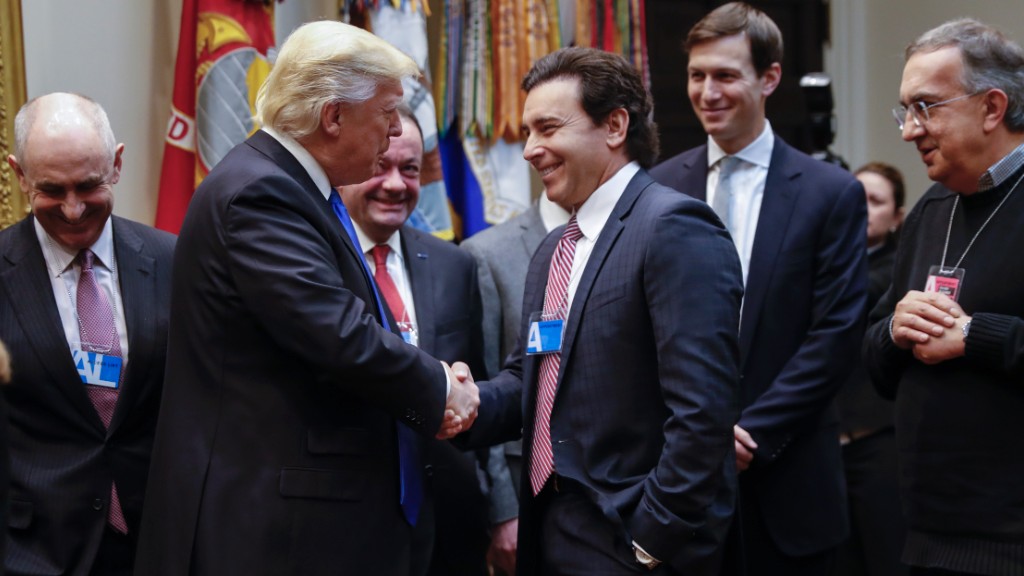
President Trump wants to get a better deal for U.S. workers very soon.
A key part of that plan is to start renegotiating NAFTA, the free trade deal between the U.S., Canada and Mexico. He blames it for the loss of millions of manufacturing jobs in America.
But nobody really knows what Trump wants a new deal to look like.
"I really don't get much of a strong, articulated sense from the administration of what they want to get out of a NAFTA renegotiation," says Joshua Meltzer, a trade expert at the Brookings Institution.
Meltzer and other experts have a few ideas about how Trump could change NAFTA to benefit U.S. workers.
But they caution: If a new NAFTA deal creates American winners, it'll create American losers too. In a nutshell, manufacturing workers could benefit at the expense of U.S. consumers and companies.
Here are their suggestions for a deal:
1. Require more car parts to be sourced from the U.S.
2. Require better labor and environmental standards in Mexico -- make Mexico more expensive, really.
3. Force Mexico to end its value-added tax.
Related: Will the U.S. and Canada leave Mexico behind?
1. Make more in NAFTA!
Cars are by far the biggest export from Mexico to the U.S. A rule in NAFTA requires that any cars being sold in America -- or Canada or Mexico -- have 62.5% of parts from those three countries. It's called "rules of origin."
The rest of the car parts can come from anywhere else in the world. Trump's team wants to change that.
"We want tighter rules of origin," Peter Navarro, director of the White House National Trade Council, told CNBC Wednesday morning.
What Navarro probably means: Increase that percentage, forcing companies to source more of their parts and materials from Canada, Mexico and the U.S.
"It's quite plausible they could raise that number and that very likely would mean more parts would be sourced in the United States, which would mean more jobs," says Gary Clyde Hufbauer, a trade expert at the Peterson Institute of International Economics.
But there's a catch, experts stress. If you force car companies like Ford (F) and GM (GM) to use more U.S. parts, that will likely raise car prices for ordinary Americans.
People would be paying more for cars and would then have less cash to spend on other goods. That could cost jobs in other industries. That's how it played out in the past.
It could also make some companies less competitive globally. By forcing them to source more expensive U.S. car parts, they will face the challenge of competing with foreign car companies that don't face that restriction.
"It will result in some increase in U.S. jobs at the expense of other sectors and of consumers," says Alan Deardorff, a trade expert at the University of Michigan.
Navarro, Trump's trade adviser, said Wednesday that any price increases would be "relatively modest" and wouldn't have a major negative impact on ordinary Americans.
Exactly how many jobs would come back is anyone's guess. And it's possible this rule change could backfire on Trump and cost more jobs than it brings back by raising consumer prices.
Related: All those coal jobs aren't coming back
2. Make it more expensive to manufacture in Mexico
Another way to encourage companies to bring back jobs is to level the playing field with Mexico. That means raise labor standards in Mexico by setting a limit on hours worked per week, ensuring workers are safe, the factories are meeting environmental standards and workers are paid more.
It's actually something Democrats often advocate for.
"Better labor standards would be good first and foremost for Mexicans. It's the morally right thing to do," says Scott Sinclair, a trade expert at the Canadian Centre for Policy Alternatives.
The same goes for environmental laws. Some companies move jobs to Mexico because the air and water protection laws aren't as strong and companies can get away without paying a major penalty. Raising the bar on environmental laws in Mexico could convince companies to move jobs back.
But experts say that it still doesn't guarantee more jobs -- if companies decide to build more factories in the U.S., many of the jobs will be done by hi-tech robots, rather than humans.
In short: tougher regulations in Mexico could be good morally and could bring jobs back. But there's no guarantee the same number of jobs getting axed in Mexico would be the same number arriving in the U.S.
Related: Argentina tried a Trump-like tariff. It didn't go well.
3. Tell Mexico to end its value-added tax
Trump hit this point hard on the campaign trail.
Mexico charges a 16% value-added tax (VAT) to companies operating in Mexico -- whether they are American or Mexican.
But Trump has called the tax unfair. Experts disagree and say Mexico's VAT is not much of a barrier. About 160 countries have a VAT. Canada has one. The United States does not.
Forcing Mexico to end its VAT would bring back "some [jobs], but not many," says Hufbauer.
For their part, Mexico and Canada want a deal that benefits them too. Experts say Trump should be prepared to offer concessions to them if he wants a new deal. Mexico's economy minister even warned Tuesday that Mexico could withdraw from NAFTA if a new deal isn't as good as the current one.
Almost all options risk messing up global supply chains which depend on free trade to function. Disrupting that web of businesses could have several ripple effects on the U.S. economy, some expected and others unforeseen.


